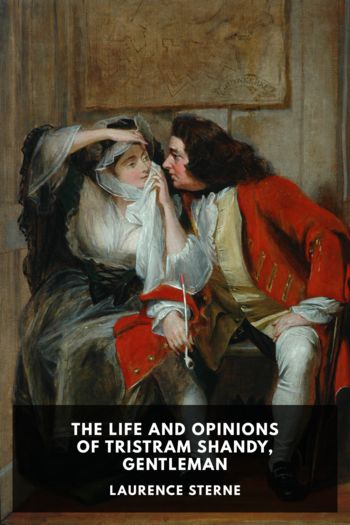The Life and Opinions of Tristram Shandy, Gentleman - Laurence Sterne (best motivational books to read txt) 📗

- Author: Laurence Sterne
Book online «The Life and Opinions of Tristram Shandy, Gentleman - Laurence Sterne (best motivational books to read txt) 📗». Author Laurence Sterne
The manner in which these delightful persons (I observe with shame that I had omitted the modest worth of Mrs. Shandy, nearly the most delightful of them all) are introduced to the reader, may have suffered a little from that corrupt following of which enough has been said. I can only say, that I would compound for a good deal more corruption of the same kind, allied with a good deal less genius. It can scarcely be doubted that there was a real preestablished harmony between Sterne’s gifts and the fatrasie manner; certainly this manner, if it sometimes exhibited his weaknesses, gave rare opportunities to his strength. And the same may be said of his style. He might certainly have given us less of the typographical tricks with which he chose to bedizen and bedaub it, and sometimes in his ultra-Rabelaisian moods—I do not mean of gauloiserie but of sheer fooling—we feel the falsetto rather disastrously. It is constantly forgotten by unfavourable critics of Rabelais that his extravagances were to a great extent, at any rate, quite natural outbursts of animal spirits. The Middle Ages, though it has become the fashion with those who know nothing about them to represent them as ages of gloom, were probably the merriest time of this world’s history; and the Reformation and the Renaissance, with their pedantry and their puritanism, and worst of all their physical science, had not quite killed the merriment when Rabelais wrote. But though animal spirits still survived in Sterne’s day, it cannot be said that in England, any more than elsewhere, there was much genuine merriment of the honest, childish, medieval kind, and thus his manner perpetually jars. Still the style, independently of the tricks, was excellently suited for the work. It is a moot point how far the extremely loose and ungirt character of this style, which sometimes, and indeed often, reaches sheer slovenliness and solecism, was intentional. I think myself that it was nearly as deliberate as the asterisks, and the black and marble pages. We know from the Sermons that Sterne could write carefully enough when he chose, and we know from the MS. of the Journey that he corrected sedulously. Nor is it likely that he had the excuse of hurry. The shortest time that he ever took over one of his two-volume batches was more than six months; and looking at the practice, not of miracles of industry and facility like Scott, but of rather dilatory writers like Thackeray, one would think that the quantity (which is not more than a couple of hundred pages of one of these present volumes) might be written in little more than six weeks. At any rate, the style, conversational, unpretentious, too easy to be jerky, and yet too broken to be sustained, suits subject and scheme as few others could.
But there is perhaps little need to say more about a book which, though some say that few read it through nowadays, is thoroughly well known in outline and in its salient passages, and which will pretty certainly lay hold of all fit readers as soon as they take to it. Of its writer a very little more may perhaps be said, all the more so because those who, not understanding critical admiration, think that biographers and editors ought not only to be just and a little kind, but extravagantly partial to their subjects, may conceive that I have been a little unjust, or, at any rate, a little unkind to Sterne. If so, they have not read his own extremely ingenious, and in general, if not in particular, very sound attack on the adage de mortuis. But if not nil nisi, there is yet very much bonum to be said of Sterne. He was not merely endowed with a singular and essential genius; he was not merely the representative and mouthpiece, in a way hardly surpassed by anyone, of a certain way of thought and feeling more or less peculiar to his time. These were his merits, his very great merits as a writer. But he had others, and great, if not very great ones, as a man. Though never rich, he seems to





Comments (0)